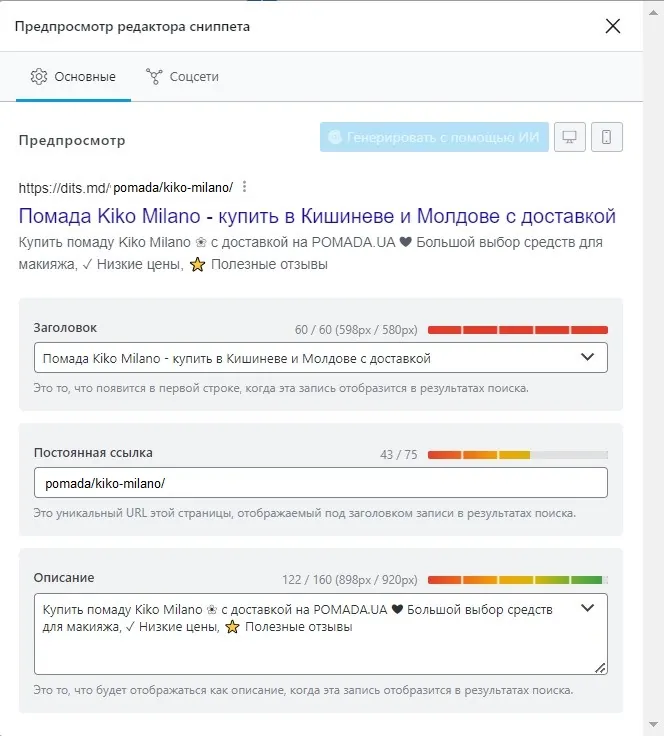What is meta description in SEO?
Author - Constantin Nacul
A meta description is a brief description of the content of a webpage, typically about 150-160 characters long.. It appears under the page's title in search engine results and serves as a summary that entices users to click on the link. While meta descriptions themselves don't influence a page's ranking in search engines, they play a crucial role in improving click-through rates (CTR), which can indirectly affect SEO performance.

Purpose of meta descriptions:
The main purpose of a meta description is to provide a clear and concise summary of the content of a web page. This helps search engines and users understand what the page is about and whether it matches their search query. A well-written meta description can lead to increased engagement by encouraging more clicks, which signals to search engines that the page is valuable and relevant to the search query.
How to add meta description?
To add a meta description to a page, insert it into the section of the HTML code for each page. The meta description is placed inside a meta tag, for example:

Most content management systems (CMS) and SEO plugins provide the capability to easily add and edit meta descriptions by offering dedicated input fields.
For instance, in WordPress it looks like this:

Google can automatically generate a meta description (snippet) for your pages based on the search query, page content, and the meta description provided. In this case, the information that, in Google's opinion, best matches the user's search query is selected.
Best Practices for Writing Meta Descriptions:
- Be concise and clear. Keep your meta description between 150 and 160 characters. This limit ensures the entire description is visible in search results, preventing important information from being cut off.
- Include targeted keywords. While the meta description itself doesn’t impact rankings, including relevant keywords can help users quickly identify if the content relates to their search query.
- Encourage action. Use actionable language that invites users to click, such as "Learn more," "Get started," or "Discover."
- Provide value. Be clear about what the user will get by visiting the page, such as free resources, key insights, or compelling solutions to their problems.
- Avoid duplication. Each page must have a unique meta description. Duplicate descriptions can confuse users and make it difficult for search engines to differentiate between the pages on your site.
- Use rich snippets where applicable. Sometimes it's useful to structure your meta description content to encourage the display of rich snippets that are enhanced with elements such as star ratings, images, or other important information.
Example of a Meta Description:
Let's consider a webpage that sells organic coffee. An effective meta description for this page could be:
“Buy organic coffee, from the best plantations in the world. Delivery throughout Chisinau and Moldova. Large assortment of scents, affordable prices. Order online today!”
This meta description uses active language, mentions the product (organic coffee), hints at the content of the page (flavor selection), and encourages the user to visit the page to order.

Impact of meta description on SEO:
Meta descriptions themselves do not directly affect a page's position in search engine results. However, they influence user behavior in SERPs (search engine results pages), which is critical. A compelling meta description can improve the likelihood that a user will click on your result, thereby increasing your site's CTR. This user interaction sends positive signals to search engines, suggesting that your site is likely to satisfy the user's intent. Over time, high CTRs can lead to improved organic ranks.
Additionally, if a user quickly returns to search results after visiting your site, this may indicate to search engines that the page is not as relevant or engaging as the meta description suggests. This may negatively impact your efforts to SEO.
So, meta descriptions play a key role in attracting user attention and can affect the overall effectiveness of your SEO strategy. Creating unique, compelling, and clear meta descriptions for each page not only helps improve visibility, but also increases the likelihood of users interacting with your content. This interaction, in turn, helps increase the authority and relevance of your pages in the eyes of search engines, benefiting your SEO efforts in the long run.
You can also read the articles:

